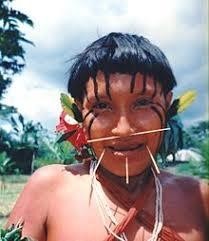Why is an Amazon tribe talking to Indians about Blood Gold?
The Yanomami people, who live in a settlement deep inside the rainforest, have been threatened for several decades by illegal gold miners who invade their land and bring diseases.
- From the remote rainforests of Brazil, a little- known tribe has made an emotional appeal to Indians: “The gold which has come from our Yanomami territory is Blood Gold, gold at the cost of indigenous blood. I’d like to send a message to the people of India, to the Indian government and the companies which import it: You must stop buying Blood Gold. Buying Blood Gold is not good. It’s important that the government thinks again, that the Indian people think again and do not buy Yanomami Blood Gold.”
- The appeal, by Dario Kopenawa of Brazil’s indigenous Yanomami people, was posted in a video online with English subtitles by Survival International, an international human rights advocacy based in London, which campaigns for the rights of indigenous and tribal peoples around the world.
- The Yanomami live in the rainforests and mountains of northern Brazil and southern Venezuela, and are, according to Survival International, the largest relatively isolated tribe in South America.
- The Yanomami are believed to have crossed the Bering Strait from Asia into North America perhaps 15,000 years ago, and travelled southward to their home in the Amazon. Survival International says the tribe numbers around 38,000 today, and its members live in contiguous forested territory of around 9.6 million hectares in Brazil and 8.2 million hectares in Venezuela.
- The Yanomami practise an ancient communal way of life. They live in large, circular houses called yanos or shabonos, some of which can hold up to 400 people.
- Rituals, feasts and games are held in the main, central area. Each family has its own hearth where food is prepared and cooked during the day. At night, hammocks are slung near the fire which is stoked all night to keep people warm.
- It is a Yanomami custom that a hunter does not eat the meat he has killed. “He shares it out among friends and family. In return, he will be given meat by another hunter,” says the website of Survival International.
- The Yanomami consider all people to be equal, and do not have a chief. Instead, all decisions are based on consensus after long discussions and debates.
Gold rush in Yanomami country
- Since the 1980s, the Yanomami have been facing an onslaught from illegal gold miners. According to Survival International, Yanomami land was invaded by up to 40,000 miners who killed the indigenous people, destroyed their villages, and brought them deadly diseases. A fifth of the Yanomami population perished in just seven years.
- Following a sustained campaign led by Survival International, the Brazilian government notified a ‘Yanomami Park’ in 1992, and the miners were expelled. However, they kept returning, and in 1993, they murdered 16 Yanomami including a baby in Haximú village. A Brazilian court subsequently found five miners guilty of the massacre. However, the illegal entry of gold miners in Yanomami country continued.
- Fiona Watson, Research and Advocacy Director at Survival International, told The Indian Express, “The situation is getting more desperate as the number of illegal gold miners has increased dramatically in the last few years and the authorities have done little to tackle the problem. The Yanomami are facing a social and environmental catastrophe in terms of their health and the forest and rivers they rely on.
- “Two scientific studies by Fiocruz (one of Brazil’s leading research institutes) have shown that some Yanomami communities near the illegal mining zones are facing dangerously high levels of mercury contamination (significantly over the WHO safety limit).”
Why the appeal to Indians?
- Watson says gold mined illegally in Yanomami land has most likely been coming to India since at least 2018 – “but it could be earlier than this as it has been traded on the black market for years”.
- In June 2019, BBC Brasil reported that the state of Roraima, in which many Yanomami live, had exported 194 kg of gold to India since September 2018, quoting figures from Comex Stat, the Brazilian Ministry of Economy portal on foreign trade. Roraima, the report said, has no legal gold mines, but is the state where most of the illegal gold is mined.
- A report on the Yanomami published in The New Yorker magazine in November 2019 (‘Blood gold in the Brazilian rainforest’) said a third of the gold produced in Brazil is sold as jewellery in India and China, and that it was difficult for buyers to distinguish between legal and illegal gold. The BBC Brasil report said India was “the fourth largest importer of Brazilian gold in the world”.
What now for Yanomami
- The tribe has launched an initiative called MinersOutCovidOut to enlist the support of Brazilian society and the international community to lobby the Brazilian government to take urgent action to remove the miners and to prevent the spread of the coronavirus.
- “One of the transmission routes of the virus in the territory is through the miners who enter and leave the Yanomami territory with impunity. The NGO ISA wrote a report warning that Covid-19 is likely to be transmitted by the miners and in the worst case scenario 40 per cent of Yanomami living in the mining zones could be infected and hundreds could die from the virus,” Watson said.

